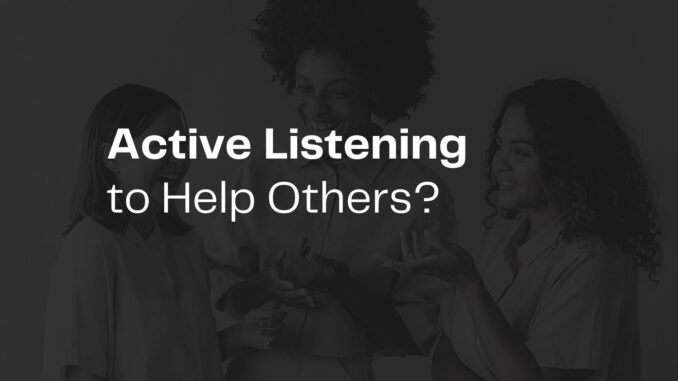
The past few months have changed the world, and the pandemic and confinements took a heavy toll on people’s mental health. This topic needs to be addressed as mental stress is invisible, and people are usually not open to the idea of discussing this with their peers and families. It not only decreases their productivity, but it can permanently leave a scar that, with time, becomes challenging to heal. You do not need to be an expert in psychology to deal with your peers’ stress and mental health. You need to be more empathic towards them, and there are some simple steps that you can take to improve the overall well-being of your peers. If you read leadership books, you might find a list of qualities that makes a good leader. Above all those qualities, I will put active listening on the top. Being a volunteer and active listener at one of the web-based support groups, I have realised that people want to be heard and understood most of the time. In very few cases, they would need professional support.
‘I’ve learned that people will forget what you said, people will forget what you did, but people will never forget how you made them feel.’ – Maya Angelou
Active listening is an art that might take some time to cultivate in your habits. It is about focusing on what the other person is saying and understanding them entirely from their perspective. It is about making others feel heard, valued and understood. Listening is all about communication and getting information, but active listening is not just about communication but understanding the complete message someone is sharing.
How to practice Active Listening to deal with the mental stress of your peers?
- Ask if they would like to share: Politely ask your peers/team-member if something is bothering them and if they would like to share (do mention that merely sharing and talking helps sometimes). Men are less likely to share as they prefer to go to their cave during difficult times and solve problems independently. On the other hand, women prefer to discuss their issues with their friends.
- Find a non-distracting environment to talk: People like to talk about themselves with others, given they are being heard and understood in a safe and private space. Find a comfortable and non-distracting room to talk. Any disturbance might make the speaker uncomfortable.
- Give them personal space: Do not interrupt the speaker as it might make them feel unwanted. Let them speak at their own pace.
- Give cues, be present and attentive: Try to understand what they are saying, nod regularly and give cues like “mmhmm”, “okay”, etc., to let them know that you are listening attentively. Please pay close attention to non-verbal cues like their facial expressions, emotions, and body language.
- Do not judge: We as humans have an intrinsic tendency to judge others based on past experiences with them or topic, their race, gender, age, culture, physical appearance, etc. We should not judge people as it is the most common reason people are reluctant to discuss their problems with others.
- Show kindness and empathy: If you have had a similar experience[s] in the past, it may prove helpfull to share it with your peers. This way they can more easily relate to you and share back their own experiences. If you could not find any shared experience[s] or you are unable to relate to them, perhaps, you might want to say “I can understand what you might be going through” or “I never had such experience in the past, but I can imagine what you might be feeling”.
- Do not assume and ask questions: Do not assume what the speaker might be saying but instead listen to them attentively. If you come across some unacquainted phrase or jargon, ask them what does it mean. Ask open-ended questions as it leaves room for details to be filled by the speaker (Do not ask too many questions with a poker face as it might make them feel that you are interrogating them).
- End the discussion on a positive note: Acknowledge their worries and issues, and validate them. Ask if there is something you could do to help them. End with a polite message stating that they can approach you if they wish to talk again.
Active listening might not only help you understand your peers and team members, but it also fosters trust and relationships. In most cases, having such a discussion would re-energise the speakers and make them feel validated. They would feel a sense of belonging and perform much better knowing that someone in the organisation understands them. However, if someone shows suicidal tendencies, I recommend approaching a professional therapist/psychologist. Active listening might be helpful, but it is not a substitute for professional help, and it is always better to have a mental health professional in the organisation to help employees deal with mental and emotional distress.
The article was originally published as a part of PMI-Luxembourg Chapter newsletter
Be the first to comment